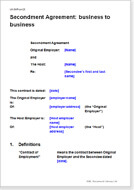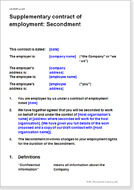Secondment agreements
It goes without saying that secondment requires careful handling. Issues include confidentiality, original employer obligations and the practicalities of how the arrangement will work.
These documents enable secondment to either another commercial organisation or to a charity. Either can be edited to suit many other situations. The law in these documents is clear and firm but carefully unaggressive and unobjectionable.
Secondment agreement: business to business
This is a pack of two documents to enable a transfer to take place:
- an amendment to the employment contract of the secondee, and
- a secondment agreement between the original employer and the host organisation
It is suitable for:
- commercial organisations of any size, in any industry, in the UK or abroad
- employees at any level within the business
- secondments of short or long time periods
Secondment agreement: to a charity or voluntary organisation
This is a pack of two documents to enable a transfer to take place:
- an amendment to the employment contract of the secondee, and
- a secondment agreement between the original employer and the host organisation
It is suitable for:
- non-profit organisations of any size, including charities, in the UK or abroad
- employees at any level within the business
- secondments of short or long time periods
The document aims to give the original employer additional protection where the secondee is working abroad:
- in places where local employment law may be less clear
- where access to facilities (including medical care) might be restricted
- where there may be additional costs such as for travel and visas

If the document isn’t right for your circumstances for any reason, just tell us and we’ll refund you in full immediately.

We avoid legal terminology unless necessary. Plain English makes our documents easy to understand, easy to edit and more likely to be accepted.

You don’t need legal knowledge to use our documents. We explain what to edit and how in the guidance notes included at the end of the document.

Email us with questions about editing your document. Use our Lawyer Assist service if you’d like our legal team to check your document will do as you intend.

Our documents comply with the latest relevant law. Our lawyers regularly review how new law affects each document in our library.
Introduction
Seconding an employee usually requires two documents: an amendment to the secondee's employment contract to allow the transfer, and a contract between the original employer and the new employer (the "host") setting out the terms of the arrangement between themselves. With each product we provide both.
The essence of secondment is that the secondee works exclusively for another organisation, usually for a fixed period. Importantly, under current UK employment law, the original employer continues to carry all the legal obligations relating to the employment, including the risk of an application to an employment tribunal resulting from an act or omission by the host, or some accident while the secondee is at work for the host.
Because liability remains with the original employer, these agreements are designed as far as possible to protect that business against failure by the host business to comply with both the contract of employment and the general law. It also guards the intellectual property rights of both organisations.
The law in these documents
There is little statutory law regulating secondment, but the legal implications of secondment on employment law are great. It is therefore essential that the original employer and the host agree the terms of the transfer in as much detail as possible.
Our templates include all the basic arrangements you will need. You can easily add, edit or remove provisions to suit your arrangement.
Suitability of use
Our agreements can be used by organisations of any size, and in any industry. Since the original employer faces most risk, we suggest that it is he or she that suggests the terms in the first instance.
It is possible to draw a single agreement between all three parties. However, because one agreement may contain terms confidential to only two of the parties (such as how much the original employer will receive in consideration) we have structured the agreements as two documents.
By listing the terms of the transfer in a schedule you have total flexibility on what work the employee will do, and all three parties know what is expected.
What the agreements cover
Some of the paragraphs in the two agreements deal with similar matters, others are unique to the arrangement between two of the three parties. Together the documents consider:
Practical terms
As well as confirming the arrangement, these provisions deal with opt-out of the Working Time Regulations and acknowledgement that the host has received copies of the employment contract and policies under which the employee works.
Identity of the host and negation of original employer’s liability for the nature of work
The paragraphs confirm what or who exactly is the host and what is the nature of its business. The employee accepts that the original employer is not responsible if the nature of the work is not as expected.
Term and termination
Sets out the length of time the contract will be in place and the conditions under which it can be terminated.
Continuing duty of the employee to the employer
Reminds the secondee that he or she remains an employee of the original employer throughout the arrangement.
Expenses and changed entitlements
These paragraphs cover how the employee will be reimbursed for expenses, and how his or her benefits and entitlements under the original employment agreement change.
Obligations of the employer and host to each other and to the secondee
This section ensures that the host abides by rights that the secondee has under the original employment agreement (so far as they cannot be changed by the secondment) and takes responsibility for expenses incurred (excluding salary).
Non competition provision to safeguard employer’s business
The section covers the very difficult area of non-compete during and after the secondment. If the host has similar clients to the original employer then either party may want to ensure that customer poaching does not occur as an unintended consequence of the arrangement.
Indemnity by host
While the original employer remains liable for the wellbeing of the secondee throughout, this indemnity protects the original employer from the cost of failures by the host to comply with the law.
Intellectual property rights
This section grants the original employer ownership and benefit of any intellectual property that the employee creates. Of course you can change this to give the benefit to the host.
All rights reserved


